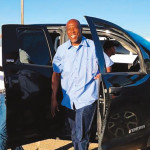
Living with HIV and AIDS has been a trial in itself. Add to that a lifestyle that included addiction and criminality, and you have a recipe for disaster. I was incarcerated when the AIDS epidemic was at its peak of intensity and urgency. My life was out of control, and dealing with addiction, sexuality and a morbid disease was overwhelming.
Sometimes it was easier to remain in prison because HIV to me was a prison for “bottom feeders” and society’s predators. My thought process at the time was that it was my just deserts. In an environment like prison, all the stigma of HIV becomes triple-fold due to fear, ignorance and peer pressure. Having to hide my disease interrupted much needed treatment and kept me off a medication regimen for two decades.
Today, two of my passions are reintegration and increased socialization for people who were incarcerated because I witnessed firsthand man’s inhumanity to man. The cruelties suffered by most of my fellow inmates who were HIV positive and homosexual I wouldn’t wish any human being to endure. I became one of the ringleaders of that cruelty, hiding my guilt, anger, shame and sexuality by transferring my affliction onto others. However, that was a different time and I had a different mindset.
Today, I strive to ensure that any prisoner — gay, straight or otherwise identified — can have the continuity of care that I enjoy today. It shall be my legacy to find ways for a person who is HIV positive and happens to fall into the prison system to learn how to navigate services, become a true partner in their own care, be assertive about their treatment, encourage dialogue with providers and, most importantly, shed that “Scarlet Letter” of HIV/AIDS. That stigma will certainly impede them from returning to their communities as law abiding, productive members of society.
For me, sobriety and treatment adherence are just two of the main keys to my successful reintegration process. A third and vital component has been my involvement in the Action Center and Prison Health Think Tank at GMHC. When someone asks me what the Action Center is, I say, “It’s where consumers become citizens,” because for me it is actually the first place I felt like a citizen post-diagnosis.
Through GMHC’s Action Center, I first met with former New York State Senator Thomas Duane. It was cathartic seeing for the first time a man who was openly gay, HIV-positive and a mover and shaker in city and state government. To be quite frank, in the not too distant past, my self-perception was if you touch me, you got dirty. Being able to rub elbows with elected officials, form opinions, have intelligent discourse and help influence policy has been so vital in my personal growth. I am now able to live life at my personal best.
Today I know that life is for the living and I also have learned to “frame” my treatment. My health regimen is my cure. I am far beyond survival. I have survived.
If one person will allow me to be a template for reintegration and increased socialization, then my job is done. I think a place like GMHC, interactions created by the Action Center, and community-based organizations like Village Care, HELP/PSI and AIDS Service Center NYC are the best medicine for someone ready to rejoin the living.
Ronald Regins is the Co-chair of the GMHC Action Center Prison Health Think Tank
To read the issue as a PDF, click here.







Comments
Comments